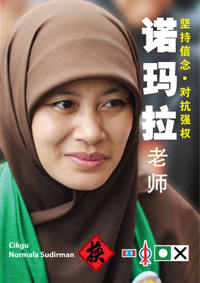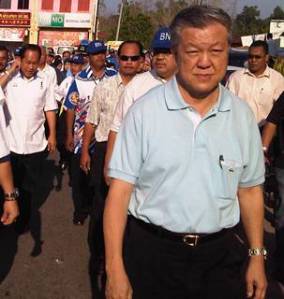Bridget Welch* on Tenang By-Elections
Malaysia’s 14th by-election since March 2008 scored another victory in the BN column, as they held onto their seat. This was expected, as it was home ground for UMNO and the contest was purely about the winning majority.
Even with the lower voter turnout, UMNO did well with a comfortable and higher majority of 3,707. Rather than provide a numerical assessment of the voting results, let me share some broader observations and tensions that arise from the Tenang campaign.
Despite the centrality of machinery and money, this election highlights the increasing challenges of engaging the diverse electorate in Malaysia. Arguably, the dynamics of the by-election in Johor muddy the waters, making the decisions about national electoral strategies and tactics even more complex.
Decision to proceed irresponsible
The most defining feature of this election was the weather. It was dreadful, and it negatively affected the polling. Watching voters drench themselves to vote, despite umbrellas, and wade in up to knee-high water to the polling station, made me question whether the by-election was worth the risks involved.
I remain deeply puzzled why this by-election was not postponed. I woke up the morning of the poll thinking that it might already be time for Noah’s Ark as the overnight downpour had already affected roads and submerged parts of the constituency.
The fact that four polling stations (30 percent of the stations) were inaccessible by early afternoon made this question even more salient. It is fortunate that no one was seriously hurt and some voters were able to navigate the slick hazardous conditions, as the decision to continue with the polls appeared irresponsible.
Voters, however, braved on. They believed strongly in their civic responsibility to vote, to have their opinion recorded despite the inconveniences involved in casting it. This speaks to an important feature of Malaysian politics, that even despite lackluster campaigns on both sides, when asked to act responsibly, to fulfill their roles as citizens, they do so.
It was not only a matter of reward or partisanship, but a deep-seated desire both to be heard and be part of the national political landscape. Johoreans, in particular, feel left out of the excitement, and don’t like to be ignored.
What was striking is that the weather highlighted perhaps the biggest governance problem locally – flooding. While it is easy to think that climate change and heavy rain were responsible, the fact remains that flooding is also man-made.
The land development practices of clearing land and failure to adequately monitor deforestation have contributed to the high siltation of the streams and river and created increased vulnerability to flooding. The low-lying areas are well-known, but the problem has clearly been inadequately addressed.
Part of the problem is that flooding lies in the multiple jurisdictions of state and federal authorities, but this should not have been an excuse in Johor. The infrastructure is not up to par, and regular flooding is now the norm. Just a few years ago, areas in Johor were completely submerged.
This by-election is a wake-up call to the BN government to act responsibly. The Tenang by-election showcased the problem of flooding that is now frequent in semi-rural areas throughout the country. It is a national problem that needs attention. Many of the voters who opted for the BN did so with the hope that conditions would improve in the future, that their civic responsibility would yield a more responsible government response.
Chinese not spooked by Islamic State
The reasons people voted as they did are not so easy to capture. Three interesting features stand out. First, the focus among voters was on the party rather than the candidate. For BN voters, the dominant thread was loyalty to UMNO. For the majority of opposition voters, the focus was primarily on Pakatan Rakyat.
Chinese voters were not as scared off with the Islamic State tactics, while those loyal to PAS continued to feel both a connection to the Islamic Party and its cooperation with other component partners. In other by-elections, the candidate chosen was decisive. Here, given the credentials of both candidates, party emerged as more central.
This suggests that while the choice of candidate may be increasingly important in urban areas, the image and identity of the party remains central in more semi-rural communities. Both of the main parties concerned – UMNO and PAS – have challenges in improving their images and profiles in parts of the country, especially those where they have limited machinery or tainted images.
Another feature of Tenang was the lack of political awareness or interest. Many, especially in the more rural areas, had never even heard of Pakatan and many were just not interested in politics.
The intense politicking followed closely by Malaysiakini readers does not permeate the lives of Tenang voters, and they like it that way. Unlike Sibu, there was not a major political awakening in Tenang and voters did not relate to many of the opposition concerns about corruption and justice.
This is a challenge politically, as many outside of urban centres have limited sources of political information and do not connect with issues touted by the urban-based political leaders the same way. Take ‘Interlok’, for example. This book was seen as distant from the life experience of voters. Meshing political issues with local outlooks remains a challenge across the political spectrum.
Finally, given the dominance of UMNO and its close relationship to government officials, one of the most difficult issues involves the blurred lines between government and party. The nasty weather conditions brought this to the fore, as police, fire officials, rural development authorities and election officials faced real challenges in managing their jobs neutrally.
The scarce resources of boats and equipment added to the perception – deeply held in the Chinese-majority areas where assistance was less forthcoming – that civil servants did not respond fairly. It was exacerbated by the perception and reality that voting cut along ethnic lines and added to the view that the response was ethnically biased.
Further investigation is needed to assess this, but the perception remains and is a product of the government’s failure to draw sharp lines between what is for the party work and what belongs to the citizens at large.
Given the multiple jurisdictions of governance and increased competitiveness, the need for civil servant neutrality is even more pressing. Any election should ultimately not rest on the selective use of government resources for the interest of any party. It makes the victory hollow, and raises ethical concerns and feeds unnecessarily into the increasingly racialised political lens.






